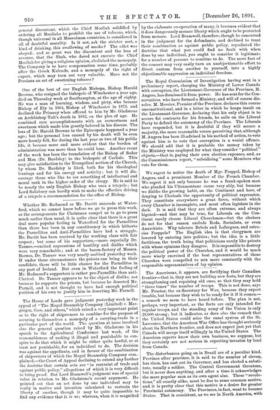The House of Lords gave judgment yesterday week in the
appeal of "The Mogul Steamship Company (Limited) v. Mac- gregor, Gow, and others," which raised a very important point as to the right of shipowners to combine for the purpose of securing to themselves a monopoly of a carrying-trade in a particular part of the world. The question at issue involved also the general question raised by Mr. Gladstone in his speech to the Agricultural Conference last week, of the reasonableness of making it illegal and punishable to con- spire to do that which it might be either quite lawful, or at least not punishable, for an individual to do. The decision was against the appellants, and in favour of the combination of shipowners of which the Mogul Steamship Company com- plained,—the Court of Appeal declining to extend any further the doctrine that certain acts are "in restraint of trade and against public policy," allegations of which it is very difficult to bring proof. But Lord Bramwell's judgment was of special value in relation to Mr. Gladstone's recent argument. He pointed out that an act done by one individual may be really in motive and intention calculated to restrain the liberty of another, though it may be quite impossible to find any evidence that it is so; whereas, when it is magnified by the elaborate co-operation of many, it becomes evident that it does dangerously menace liberty which ought to be protected from menace. Lord Bramwell, therefore, though he concurred in the judgment for the defendants, and declined to treat their combination as against public policy, repudiated the doctrine that what you could find no fault with when done by one individual, you ought to consider it legitimate for a number of persons to combine to do. The mere fact of the concert may very easily turn an unobjectionable effort to divert custom from another to yourself, into a highly objectionable aggression on individual freedom.


































 Previous page
Previous page